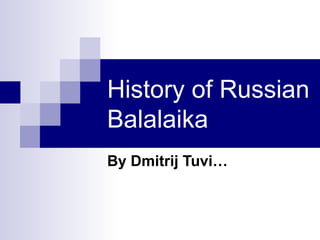
History of Russian Balalaika from 1688
- 1. History of Russian B alalaika By Dmitrij Tuvi …
- 3. Balalaika was first mentioned in a document which dates back to XVII century (1688). From this document we learn that Savka Fedoov, a citizen of the city of Arzamas, and Ivashka Fedorov, a peasant, while passing through the Yauza Gates played the balalaika. For such an imprudent behaviour they were flogged and exiled. It would never occur to a civilized person living nowadays that a severe punishment awaited anybody who gave himself to such an innocent occupation as playing the balalaika. But let us recollect the Russian history.
- 4. It happened soon after the death of the tsar Alexei Mikhailovich called "The Quietest". This tzar was famous for his hatred towards the popular Russian culture. In 1648 he issued an ukaz where he ordered to collect all musical instruments of the Russian people and to burn them. All those who dared to continue playing them were to be flogged and then exiled to the periphery of the Russian State (Ukraine).
- 5. To the end of the XVII century the persecution of Russian musicians and Russian instruments gradually subsided and at the end of the XVIII century balalaika became very popular with the public. Not only peasant boys who wanted to win favors of their sweethearts, but also court musicians played it. (Among them Ivan Khandoshkin, a violinist and a composer and Pavlovski, a bass singer in St.Petersburgh, and many others).
- 6. But after a period of popularity balalaika sank into oblivion towards the middle of the next century. Now harmonica was on the top and balalaika was played only by the poor people who did not have enough money to buy harmonica. Nobody knows what would have become of balalaika, if Vasili Andreev, a young Russian landowner had not seen it. On his way from St.Petersburgh to his estate Maryino he overheared his serf Antip play it.
- 7. Vasili Andreev who considered himself a a connoisseur of the musical instruments of the Russian people was struck with wonder, because he had not heard anything of the kind before. Having thoroughly studied balalaika and having learned to play it, he arrived at the conclusion that balalaikas possibilities are unheard-of! But it needed perfection! With his improved balalaika andreev appeared at the stage in 1886. His performance became a sensation, a household word with every citizen in St.Petersburgh.
- 8. All the papers and magazines of the city wrote about him. Inspired by his success, Andreev continued to work over his instrument untill finally he produced a whole family of balalaikas of different sizes and created an ensemble which was called "Amateurs of balalaika". The concerts of V.Andreev and his ensemble gained much popularity with the public. But he also pursued another object: having taken balalaika from the people, he wanted to return it to them.
- 9. So he started to teach the soldiers of the St.Petersburgh garnison which united the Russian citizens from all the country. Going back home each soldier took his balalaika with him. This was the way how balalaika spread all over Russia again. To the end of the XX century only in St.Petersburgh there were as many as 20 000 balalaika players.
- 10. The End. Best Wishes!